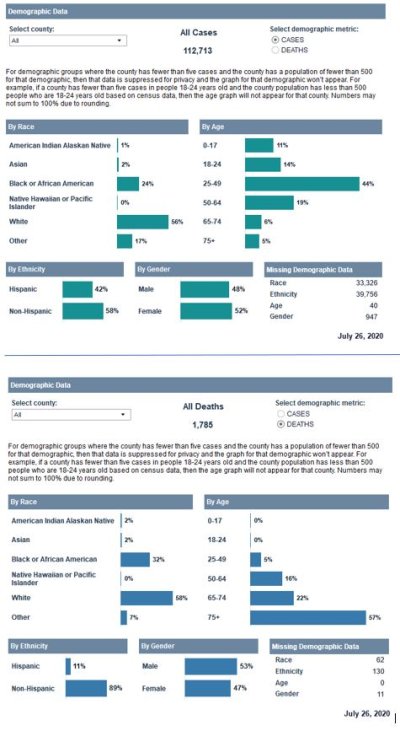Chuckanut
Give me a museum and I'll fill it. (Picasso) Give me a forum ...
The July 25-26 edition of the WSJ contains an interesting article on a study compiled by Johns Hopkins on the factors that increase our vulnerability to CV19.
https://www.wsj.com/articles/covid-...-s-11595595601?mod=searchresults&page=1&pos=1
It's behind a paywall so I will give you the most important information, IMO.
The number below are based on an analysis of 17.3 million adults in the UK between February and May of 2020.
Factors that affect CV19 and increase the risk of dying:
I like the table figures above with numbers for the increased risk. One of the most frustrating things about current CV19 advice is how vague it often is. "Having a left little toe that is longer than 0.8 inches increases the risk of death". OK, but by how much? If it raises the risk of death by 0.2% I won't even bother to get out my ruler. But, if it raises the risk by 25% I will measure my toe several times to get an accurate reading. Sometimes being a numbers kinda of guy can be frustrating.
https://www.wsj.com/articles/covid-...-s-11595595601?mod=searchresults&page=1&pos=1
It's behind a paywall so I will give you the most important information, IMO.
The number below are based on an analysis of 17.3 million adults in the UK between February and May of 2020.
Factors that affect CV19 and increase the risk of dying:
Recently diagnosed blood, lymph cancer (including bone marrow) - 2.82X
Uncontrolled diabetes - 1.95X
Liver disease - 1.75X
Respiratory disease (excluding asthma) - 1.63X
Male - 1.59X
Black - 1.48X
Moderately Obese - 1.40X
Chronic Heart disease - 1.17X
Age was far and away the most significant factor, the authors reported, with patients in their 80s more than 20 times more likely to die of Covid-19 than someone in their 50s, after accounting for all other factors. But those suffering from chronic illnesses were at higher risk of death than those without those conditions, the analysis showed. Diabetics with high blood-sugar levels were found to be almost twice as likely to die as nondiabetics. Disease of the heart, kidney and liver were also associated with a higher mortality risk.
I like the table figures above with numbers for the increased risk. One of the most frustrating things about current CV19 advice is how vague it often is. "Having a left little toe that is longer than 0.8 inches increases the risk of death". OK, but by how much? If it raises the risk of death by 0.2% I won't even bother to get out my ruler. But, if it raises the risk by 25% I will measure my toe several times to get an accurate reading. Sometimes being a numbers kinda of guy can be frustrating.
Last edited:


